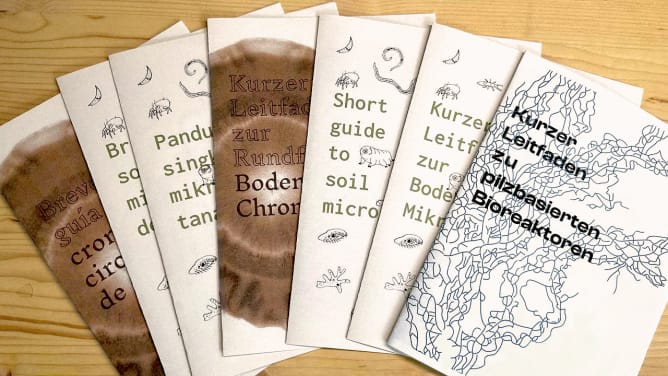HUMUS sapiens - short guides
by Julian Chollet (mikroBIOMIK), Malte Larsen, and Akvilė Paukštytė
Towards a sustainable transformation in agriculture
We want to spark enthusiasm, disseminate effective methods, promote microorganisms and help people to regenerate our soils.
The mikroBIOMIK Society is committed to an open and participatory culture of knowledge exchange. By publishing freely accessible (CreativeCommons) and high-quality educational material, we aim to empower those who are working towards a sustainable transformation.
The HUMUS sapiens project is dedicated to interdisciplinary networking, research and communication on the topic of soil ecology. Almost exactly 6 years ago, you helped lay the foundation for our work here on wemakeit and today we are once again asking for your support. In the beginning, our focus was on organizing retreats and workshops - often together with Hackteria. Now we are devoting more and more time to the implementation of local projects and the communication of methods.
Our first two guides (Soil Microscopy and Chromatography) deal with soil analysis and are already available in 4 different languages. The recently completed third guide shows you how to build and use fungal bioreactors - a promising method for regenerating degraded soils. We are very motivated to continue: Mulch systems, polycultures, forest gardens, no-till, water retention, terra preta, pasture management, catch crops, keyline design, and many other methods want to be researched and communicated.
Is there a technique that is particularly close to your heart? You can support us not only financially, but also with your knowledge and experience – become part of our network of researchers and practitioners.
We will use your support to:
#1 Dissemination and printing of already published guides
#2 Further translations - together with our international cooperation partners
#3 The realization of new guides: research, text work, illustration, typesetting, layout, translation, printing, distribution - there is a lot to do here.
You can find our publications at: https://mikrobiomik.org/en/publications
You can contact us by e-mail: humus@mikrobiomik.org
Many thanks to Christian Buthmann from the film collective Verdewelt (https://verdewelt.com) for editing our crowdfunding video. The music he used is from musicfox (https://musicfox.com).
About the rewards: We send the guides and T-shirts to all EU countries and Switzerland. In individual cases, we can also send them to other countries - but in this case, please contact us beforehand.
The guides on soil microscopy and chromatography are currently available in German, English, Spanish and Bahasa. The guide on fungal bioreactors is available in German and English.
Why is soil so important?
Far more than just the dirt under our feet, soil is a truly complex and dynamic ecosystem. It is a constantly changing mix of minerals, living organisms, decaying organic matter, air and water. It is the living skin of our planet, allowing new forms of life to come into being, incorporating the nutrients left there by organisms of the past.
Soil is bursting with life and can be vastly different from one square cm to the next. From plants, earthworms, insects and fungi to the invisible amoeba, nematodes, algae and bacteria – each creature provides their own essential role in the soil ecosystem. It may take hundreds or thousands of years for fertile topsoil to be formed naturally, but it can be eroded within just a few years. Human impact on the soil, including intensive agricultural practices (deforestation, overgrazing, use of agrochemicals, etc.) leads to compaction, erosion and loss of soil structure.
But there is a strong counter-movement. With methods from permaculture and regenerative agriculture, we can stop the downward spiral, reverse it and build humus. The soil may recover from centuries of abuse and become fertile again.









